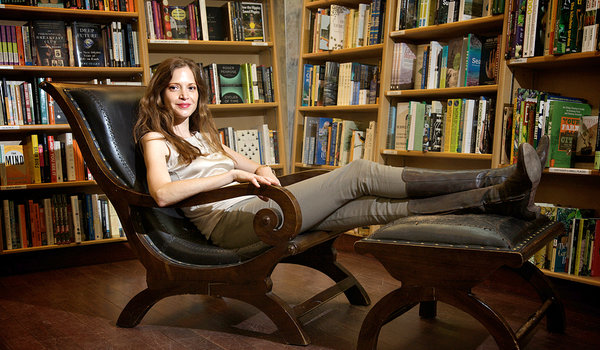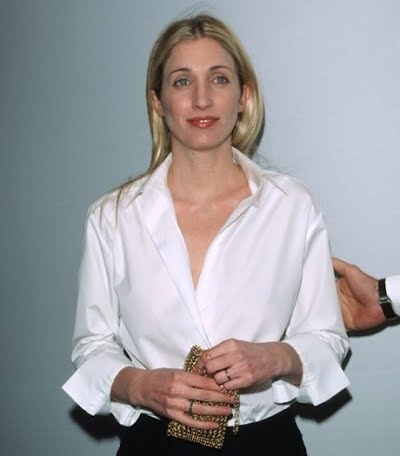Moments of awesomeness
“I feel like I got a winning lottery ticket in my life and the rug could be pulled out from under me at any time,” Ms. Zuckerberg said. “I am going to appreciate every last moment of awesomeness I can get.”
The profile of Randi Zuckerberg (sister of Facebook founder Mark) in this week's New York Times was not exactly endearing -- I thought she came across as a bit over-the-top ridiculous, which could very well be due to how the piece was written and edited. But I do completely agree with her closing sentiment.
We may not all be as financially blessed as Ms. Z, but relatively, most of us have it pretty darn good -- and we could all stand to embrace the awesomeness available to us more fully.
Hopeful shopping

Last week the New York Times' Thursday Styles section profiled bookstore owner Sarah McNally, who owns "the determinedly WiFi-free McNally Jackson Books on Prince Street in Nolita." It was a really enjoyable read, and here are a few reasons why:
The machine can cost more than $100,000, a huge investment for an independent bookstore, but it makes sense when the NYT describes it as "Ms. McNally's grand gambit against the e-book pestilence." I also loved this description:
Ms. McNally gazed tenderly at the behemoth as it printed 'Veiled Women,' by Marmaduke Pickinthall (1913) for a customer. "Look," she cooed, as mechanical thingamabobs measured and bound the new book. "It's still warm, like cookies fresh out of the oven."
And the profile is full of little tidbits as evidence. To wit:
She sipped tea, coughing, her thin body shaking. Bad cold? "Technically, I had tuberculosis," she said with a shrug.
I always think of aspirational shopping as purchasing a fancy pair of shoes that don't fit into your lifestyle, a pair of jeans that are too snug, or a luxury car you can't quite afford. But buying books can be similar in that it represents the kind of person you hope to be, knowledge you hope to have in the future. I never thought of it that way until I read this:
That love and pain stuff

I'm a little behind on this, but all of this New York Times Op-Ed based on Jonathan Franzen's commencement address to Kenyon College's Class of 2011 is worth reading. I particularly wanted to share one bit about the difference between "the world of liking" things on Facebook, and loving things and people in real life.
Franzen's speech isn't
pertinent only to today's new college grads-- those supposedly super distracted kids
that grew up with Facebook, texting, sexting, and all the rest. People of all
generations are now tempted to spend more free time in the shiny,
simple world of online social networks. We're all busy, and maintaining
real life relationships can be much more hassle than keeping up with the hundreds
of electronic connections we have online.
But in the end, loving someone in the flesh is much more rewarding than "liking" things online-- or really, anything else that we can do in this life.
"The simple fact of the matter is that trying to be perfectly likable is incompatible with loving relationships. Sooner or later, for example, you’re going to find yourself in a hideous, screaming fight, and you’ll hear coming out of your mouth things that you yourself don’t like at all, things that shatter your self-image as a fair, kind, cool, attractive, in-control, funny, likable person. Something realer than likability has come out in you, and suddenly you’re having an actual life.
...When you consider the alternative — an anesthetized dream of self-sufficiency, abetted by technology — pain emerges as the natural product and natural indicator of being alive in a resistant world. To go through a life painlessly is to have not lived. Even just to say to yourself, 'Oh, I’ll get to that love and pain stuff later, maybe in my 30s' is to consign yourself to 10 years of merely taking up space on the planet and burning up its resources. Of being (and I mean this in the most damning sense of the word) a consumer."
On being impressionable

"Her nails are unmanicured, which on her looks like the last word in efficient chic, and I suddenly find myself wondering why I bother with a weekly polish."
--from a recent New York Times Magazine article about Cate Blanchett written by Daphne Merkin
I'm certainly a fan of the weekly polish, but I can totally relate to Daphne Merkin on this: When I come into close contact with a smart, compelling, put-together woman, I'm liable to call every single one of my current sartorial choices into question.
If I'm wearing flats and I meet a cool woman in towering heels, I instantly wish I were literally in her shoes. Suddenly I want to swap my trendy pastel polish for her understated beige manicure, or vice versa. This happened most recently while covering the Women in Tech panel at Facebook, which featured some really brilliant (and amazingly dressed) women.
I recently read a memoir by Carole Radziwill that focuses in part on her friendship with the late Carolyn Bessette-Kennedy. I was too young to really appreciate CBK's style in the early 90s, but reading about her personality, and looking at her photos now, is enough to make a girl want to remove all her nail polish and toss out 90% of her wardrobe, jewelry, hair products, and makeup.